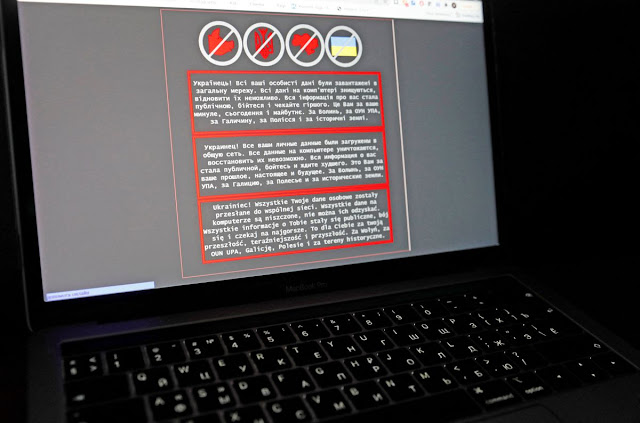 |
| Image Credit: REUTERS/Valentyn Ogirenko/Illustration |
A massive cyber attack warning Ukrainians to "be afraid and expect the worst" hit government websites on Thursday night, leaving some websites inaccessible on Friday morning and prompting Kyiv to open an investigation.
Ukrainian Foreign Ministry spokesman told Reuters it was too early to say who could be behind the attack, but said Russia had launched similar attacks in the past.
The cyberattack, which affected the Foreign Ministry, the Cabinet of Ministers and the Security and Defense Council, among others, comes as Kyiv and its allies sound the alarm on a possible new Russian military offensive against Ukraine.
"Ukrainian! All your personal data was uploaded to the public network. All data on the computer is destroyed, it is impossible to restore it," said a message visible on the hacked government websites, written in Ukrainian, Russian and Polish.
"All information about you has become public, be afraid and expect the worst. This is for your past, present and future."
After a wave of inconclusive talks this week on security in Europe, the United States on Thursday warned that the threat of a Russian military invasion of Ukraine was high.
Russia said the dialogue continued but reached an impasse as it tried to persuade the West to prevent Ukraine from joining NATO and roll back decades of alliance expansion in Europe, demand that Washington has called "non-starters".
Commenting on a cyber attack a senior Ukrainian security official told Reuters: "All cybersecurity subjects were aware of such possible provocations from the Russian Federation. Therefore, the response to these incidents is being carried out in accordance with the government.
The government later claimed that he had restored most of the affected sites and that no personal data had been stolen. Many other government websites were suspended to prevent the attack from spreading, it said .
Relations between Ukraine and Russia collapsed after Moscow's annexation of Crimea in 2014 and the outbreak of war between the same year. Kyiv forces and Russian-backed separatists in eastern Ukraine.
The United States said on Thursday that Russia could try to create a pretext to launch a new military assault on Ukraine by comparing the situation with the circumstances of 2014.
Russia warned of possible "catastrophic consequences" if there was no agreement on what the Kremlin called the security red lines, but said Moscow had not abandoned diplomacy and would even speed it up.
The Russian comments reflect a trend in which Moscow claims to want to pursue diplomacy but rejects calls to reverse the training of its troops near Ukraine and warns of unspecified consequences for Western security if its demands are not heard.
Ukraine has suffered a series of cyberattacks since 2014, which have cut power, frozen supermarket checkouts and forced authorities to back the hryvnia currency after the bank's computer systems crashed. Ukraine believes the attacks are part of what it calls Russia's "hybrid war" against Ukraine and its allies.
In 2017, a virus called NotPetya by some experts hit Ukraine and spread around the world, crippling thousands of machines as it spread to dozens of countries.
The Kremlin has denied any involvement, dismissing "general unfounded accusations".
from TechCrunch https://ift.tt/3zYgUpf








0 comments:
Post a Comment